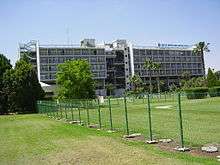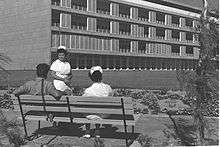Soroka Medical Center
| Soroka Medical Center | |
|---|---|
 | |
 Soroka Medical Center, Beersheba | |
| Geography | |
| Location | Beersheba, Israel |
| Organisation | |
| Hospital type | Teaching/University |
| Affiliated university | Ben Gurion University |
| Services | |
| Standards | tertiary care |
| Emergency department | Level I Trauma Center |
| Beds | 1,100 |
| History | |
| Founded | 1955 |
| Links | |
| Website | http://www.soroka.org/ |
| Lists | Hospitals in Israel |
Soroka Medical Center is a hospital in Beersheba, Israel. It is the largest medical center in the southern region of the country, and the fourth largest in Israel with approximately 1,000 beds.[1] It is owned by Clalit Health Services, the largest Health Maintenance Organization (HMO) in Israel. Soroka provides medical care to members of all populations in the region, including Negev Bedouins and Palestinians from the West Bank and Gaza Strip.[2] It is a major teaching hospital affiliated with the faculty of Health Sciences at Ben-Gurion University of the Negev whose campus is adjacent to the hospital.
History
Moshe Soroka is known for being a major pioneer of the Clalit Sick Fund Clalit Health Services and of the health services of Israel. He laid out the foundations for public hospitalization, which helped the establishment of the largest medical center in the southern region of Israel, what we now refer to as Soroka Medical Center. Moshe was born in Poland in 1903. In 1920 he immigrated to Israel and would soon prove his involvement to the healthcare in the country of Israel. From the time he immigrated to his death in 1972, Moshe laid foundations for many health services and hospitals. In 1922, he established the first aid medical services of the agricultural settlements, and managed Kupat Holim services in the Jezreel Valley. A few years later in 1927, he built the Valley Hospital, which was Clalit Sick Fund’s first. He was one of the founders of Beilinson Hospital in 1932, along with his role as the regional director of Judah, Samaria, and the Sharon. As the Clalit Sick Fund continued to grow, he became more involved with the central management, finances, and building of the fund’s institutions. It wasn’t until 1956 that Moshe Soroka founded the Central Hospital of Negev with Israel Barzilai and David Tuviyahu (mayor of Beer-Sheva at the time). Much of the funding on this hospital came from David Dubinsky, who Moshe turned[3] to in 1955. Dubinsky committed to donating a million dollar donation toward the hospital. It wasn’t until after Moshe’s death that the hospital would be called Soroka Medical Center.

The Beersheba Hospital of Kupat Holim (later Soroka Medical Center), designed in 1955 as a 250-bed hospital, grew into a 1,200-bed medical facility serving the south of the country, including the Negev region. A major American union, the International Ladies' Garment Workers' Union, headed by David Dubinsky, pledged in late 1955 to give a million-dollar gift, over four years, to establish a hospital in the Negev region, which was to be operated by the Histadrut, Israel's General Federation of Labor, which at the time owned Kupat Holim, Israel's sick fund. According to press reports at the time, Dubinsky had indicated that the ILGWU might make a further $500,000 available to the hospital after the $1,000,000 contribution was completed, as the estimated construction cost was $1,500,000.[4]
Soroka Medical Center is a pavilion-type hospital with medical facilities and wards concentrated in one multi-story block. Climate considerations led to the adoption of a loose grid design of patio gardens and pavilions connected to the main building by pergolas. The hospital area was surrounded by a green belt of pepper trees and sycamores to protect the complex from sand and dust storms.[5]
Due to Soroka Medical Center's strategic location in the Negev region, it was the primary hospital that treated casualties during Operation Cast Lead.[6] In September 2011, Soroka treated victims of a barrage of missiles from the Gaza Strip. Jon Voight visited Soroka during this time to show his solidarity with Israel.[7]
In 2013, Ehud Davidson was named director-general of the hospital replacing Michael Scherf, who held the post for six years.[8]
Centers of Excellence
Comprehensive Cancer Center
Soroka Medical Center is undergoing the process of adding a Comprehensive Cancer Center. On average, in order for a person living in the southern tip of Negev, it takes 221 miles to reach a cancer center in central Israel. When the Comprehensive Cancer Center opens in Be'er Sheva, that will no longer be the case. There will be double the amount of space for treatments, outpatient ambulatory care, inpatient oncology and hematology, bone marrow transplant facilities, advanced equipment, oncology pharmacy, expanded labs, comfortable areas, occupational, physical, and art therapy rooms. After completion, this part of the hospital will include four floors: ambulatory, oncology and hematology outpatient care, oncology inpatient care, and hematology inpatient care [9]
Milstein Trauma Center
Unfortunately, trauma has become the norm for citizens of Israel, especially in the southern region of the country. The amount of trauma Israelis are exposed to has lasting impressions, which Soroka plays a huge part in combatting. Named after Vivian and Seymour Milstein, this specific trauma center to initially target children and adolescents.[10] The trauma center focuses around family crisis, traffic accidents, severe burns, and terrorist attacks. Through the expertise of a psychiatrist, rehabilitation psychologist, art therapist, and clinical psychiatric social workers, the Milstein Trauma Center has helped patients cope with and overcome traumatic experiences. Members of the trauma team often go to Sderot to care for the children there who have been affected by missile attacks.[10]
Saban Pediatric Center
This state of the art pediatric facility was brought to attention with the donation of $14 million by Haim Saban.[11] Through his family's donation, Soroka was able to raise the standards of pediatric medicine in the Negev. With Israel's southern region being the home to 400,000 children, this pediatric center is much needed.
Neonatal Care and Maternal Health
Soroka Medical Center is in the process of opening a Neonatal and Maternal health care center. Since Soroka Medical Center is located in the south of Israel, where they are prone to missile attacks, a missile proof facility to ensure the safety of the patients. In addition to the plans for the missile proof facility, the hospital would like to expand the facilities available in this particular center. There will be an increase in the number of beds, a neonatal triage, single family rooms, open bay areas, procedure rooms, a pharmacy, a laboratory, a breast milk pumping facility, multidisciplinary support area, and a medical training facility. With all of these additions, it will be a state of the art neonatal care center. Soroka Medical Center is one of the busiest maternity centers in Israel, which on average brings 35 babies a day into the world.[12] This new neonatal and maternal health center is crucial for the population of Israel.
In-Vitro Fertilization Center
The In-Vitro Fertilization Center at Soroka is ranked very high among the best medical centers in the western world.[13] The IVF unit at Soroka, however, needs more work when it comes to the physical facilities and infrastructure. The goal is to triple the size of the unit, specifically in terms of the number of treatments given and patients served. Much work is still in place for this IVF unit. Construction costs are hoped to increase, making it possible to add examination rooms, laboratories, operating rooms, and recovery rooms.
Negev Center for Eating Disorders
There are no centers for eating disorders in the entire Negev. The Negev Center for Eating Disorders will treat hospitalized and ambulatory children, youth, and young adults.[14] It will mostly focus on assessment, diagnosis, and treatment of eating disorders, as well as education and prevention. Soroka Medical Center has come up with a detailed plan of what the Negev Center for Eating Disorders will look like when it opens.
See also
References
- ↑ Ayala Hurwicz (2007-05-07). "Sheba - Largest Hospital in Israel" (in Hebrew). Retrieved 2007-09-14.
- ↑ Care Across Borders
- ↑ http://hospitals.clalit.co.il/hospitals/soroka/en-us/AboutE/History/Pages/MosheSoroka.aspx. Missing or empty
|title=(help); External link in|website=(help); - ↑ Dubinsky Announces $1,000,000 Gift by Ilgwu to Israel Hospital
- ↑ Soroka Health Centre, Beersheba 1959
- ↑ IDF casualties stream into Soroka hospital
- ↑ Jon Voight visits terror victims
- ↑ Beersheba's Soroka University Medical Center gets new director-general
- ↑ "Comprehensive Cancer Center". http://www.soroka.org/soroka-comprehensive-cancer-center.html. External link in
|website=(help); - 1 2 http://www.soroka.org/trauma-recovery-center.html
- ↑ http://www.jpost.com/Israel/Saban-gives-14m-to-Soroka-hospital
- ↑ http://www.theyeshivaworld.com/news/headlines-breaking-stories/253350/Soroka-Hospital-Announces-a-New-Record-for-Births---68-Babies-On-Day-War-Ended.html
- ↑ http://www.soroka.org/in-vitro-center.html
- ↑ http://www.soroka.org/eating-disorder-center.html
External links
| Wikimedia Commons has media related to Soroka Medical Center. |
Coordinates: 31°15′31.67″N 34°48′5.44″E / 31.2587972°N 34.8015111°E